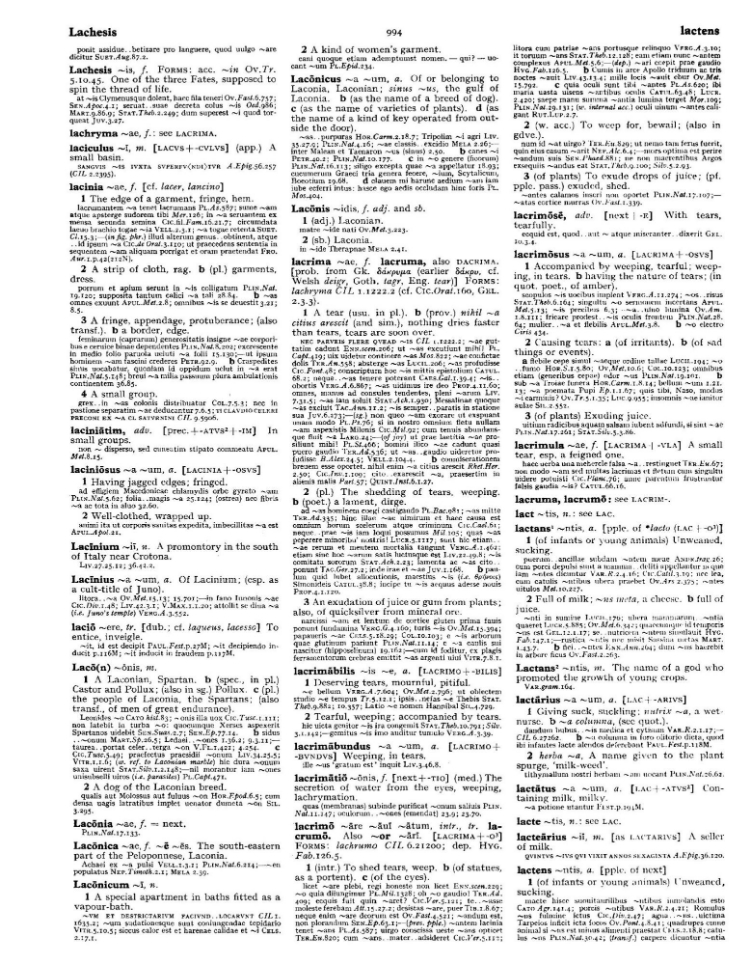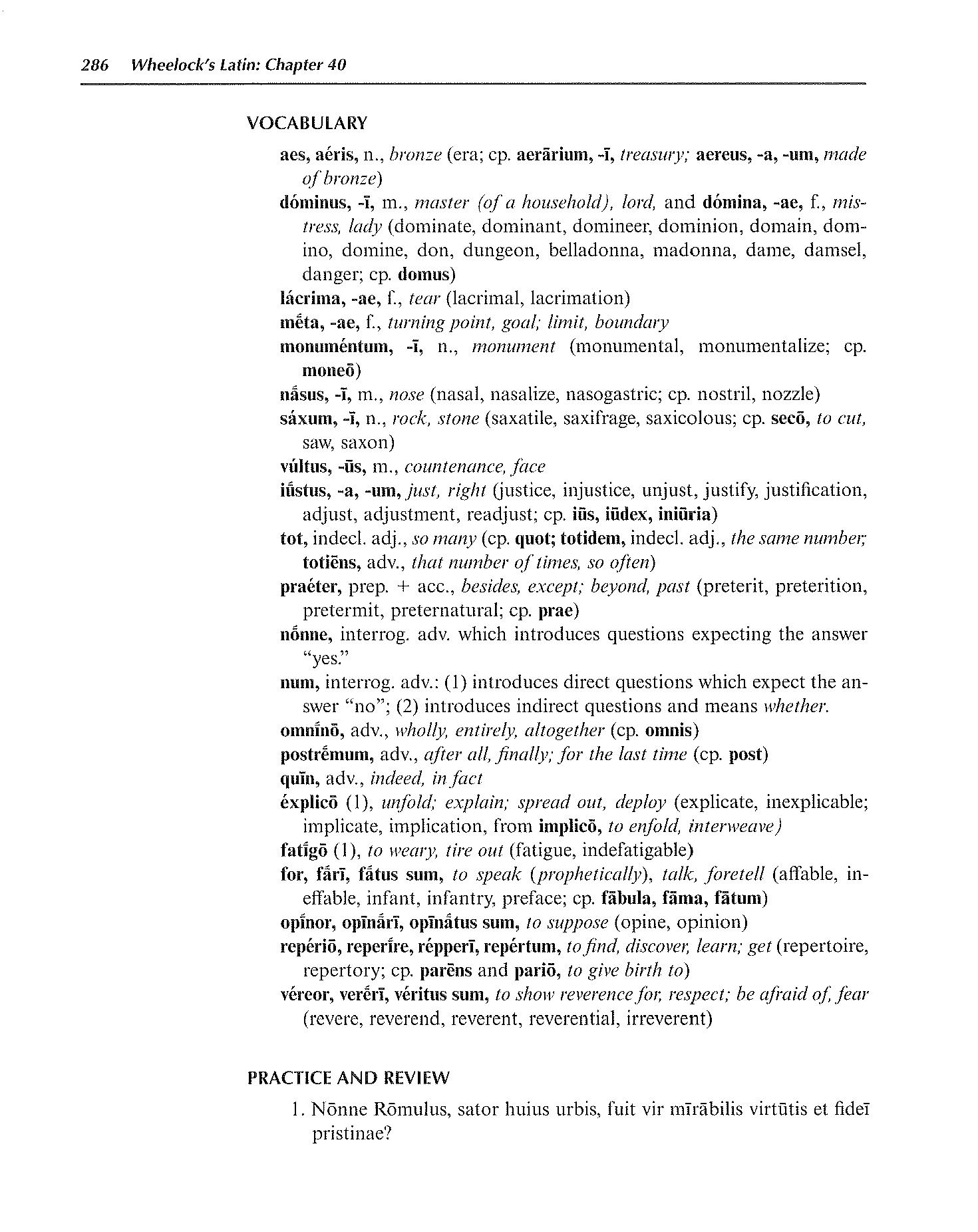
page_listing.tpl
page_subListingDetails.tpl
sub_listingDetails_style1.tpl
sub_listingDetails.title.tpl
lacrima tear
lacrima is a Latin Noun that primarily means tear.
Definitions for lacrima
Wheelock's Latin
Noun
- 1
tear
English derivatives:
lacrimal lacrimation
Oxford Latin Dictionary
Noun
- 1
A tear (usu. in pl.). (b) (prov.) nihil ~a citius arescit (and sim.), nothing dries faster than tears, tears are soon over.
- 2
(pl.) The shedding of tears, weeping. (b) (poet.) a lament, dirge.
- 3
An exudation of juice or gum from plants; also, of quicksilver from mineral ore.
Sentences with lacrima
Latin to English
Fleque meos casus: est quaedam flere voluptas: expletur lacrimis egeriturque dolor.Compare Weep for my woe; in weeping there is a certain joy, for by tears grief is sated and relieved.
Mens immota manet, lacrimae volvuntur inanes.Compare Resolute, though, was his mind; unavailingly rolled her tears.
Paratae lacrimae insidias non fletum indicant.Compare Ready tears are a sign of treachery, not of grief.
At Romae ruere in servitium consules, patres, eques: quanto quis illustrior, tanto magis falsi ac festinantes, vultuque composito, ne laeti excessus principis, neu tristiores primordio, lacrimas, gaudium, questus adulationem miscebant.Compare Meanwhile at Rome people plunged into slavery - consuls, senators, knights. The higher a man's rank, the more eager his hypocrisy, and his looks the more carefully studied, so as neither to betray joy at the decease of one emperor nor sorrow at the rise of another, while he mingled delight and lamentations with his flattery.
Declension table for lacrima
Cactus2000
| Singular | Plural | |
| Nom. | lacrima | lacrimae |
| Gen. | lacrimae | lacrimārum |
| Dat. | lacrimae | lacrimīs |
| Acc. | lacrimam | lacrimās |
| Abl. | lacrimā | lacrimīs |
Data sources
Notes
- Definitions
- Frederick M. Wheelock, Wheelock's Latin, 6th ed., rev. Richard A. LaFleur (New York, NY: HarperCollins Publishers, 2005): 286.
- P. G. W. Glare, Oxford Latin Dictionary, Vols. 1-8 (Oxford: Clarendon Press, 1982): 994.
- Word frequencies
- Christopher Francese, "Latin Core Vocabulary," Dickinson College Commentaries, last modified 2014, http://dcc.dickinson.edu.
- Paul B. Diederich, The Frequency of Latin Words and Their Endings, PhD diss., (Columbia University, 1939).
- Louis Delatte, Suzanne Govaerts, Joseph Denooz, and Etienne Evrard, Dictionnaire fréquentiel et index inverse de la langue latine [Frequency Dictionary and Inverse Index of the Latin Language] (Liège, Belgium: Laboratoire d'analyse statistique des langues anciennes de l'Université de Liège [L.A.S.L.A.], 1981): 122.
Bibliography
Allen, Joseph H. Allen and Greenough's New Latin Grammar for Schools and Colleges: Founded on Comparative Grammar. Edited by James B. Greenough, George L. Kittredge, Albert A. Howard, and Benjamin L. D'Ooge. Boston, MA: Ginn & Company, 1903.
Crystal, David. A Dictionary of Linguistics and Phonetics. 6th ed. Oxford, UK: Blackwell Publishing, 2008.
Delatte, Louis, Suzanne Govaerts, Joseph Denooz, and Etienne Evrard. Dictionnaire fréquentiel et index inverse de la langue latine [Frequency Dictionary and Inverse Index of the Latin Language]. Liège, Belgium: Laboratoire d'analyse statistique des langues anciennes de l'Université de Liège (L.A.S.L.A.), 1981.
Diederich, Paul B. The Frequency of Latin Words and Their Endings. PhD diss., Columbia University, 1939.
Francese, Christopher. "Latin Core Vocabulary." Dickinson College Commentaries. Last modified 2014. http://dcc.dickinson.edu/latin-vocabulary-list.
Gildersleeve, Basil L., and Gonzales Lodge. Gildersleeve's Latin Grammar: Third Edition, Revised, and Enlarged. 3rd ed. London, England: Macmillan and Co., 1903.
Glare, Peter G.W. Oxford Latin Dictionary. Vols. 1-8. Oxford, England: Clarendon Press, 1982.
Krüger, Bernd. "Latin Conjugation Tables." Cactus2000. Accessed May 5, 2023. https://latin.cactus2000.de/index.en.php.
Pierson, Nick. "Sound of Text." Accessed October 26, 2019. https://soundoftext.com.
Wheelock, Frederick M. Wheelock's Latin. 6th ed. Revised by Richard A. LaFleur. New York, NY: HarperCollins Publishers, 2005.
Wiktionary Contributors. "Victionarium." Wikimedia Foundation, Inc. Updated March 18, 2019. https://la.wiktionary.org/wiki/Victionarium:Pagina_prima.
Citation
Chicago (17th ed.)
Allo Contributors. "lacrima, lacrimae (n.) - Latin Word Definition." Allo Latin Dictionary. Last modified . Accessed February 20, 2026. http://ancientlanguages.org/latin/dictionary/lacrima-lacrimae.
Entry created on . Last updated on .







